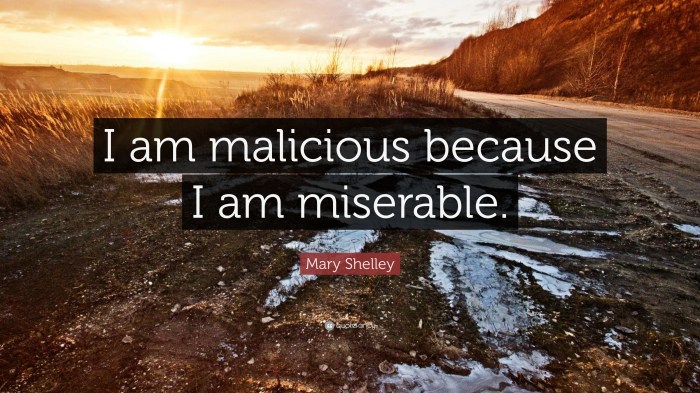I am malicious because I am miserable. This assertion may seem paradoxical at first glance, but upon closer examination, it reveals a complex and disturbing truth. Misery, in its various forms, can drive individuals toward malicious actions, both subtle and overt.
This essay will explore the relationship between misery and malicious intent, examining the psychological mechanisms that link them and the potential consequences of allowing misery to fuel harmful behavior.
From personal vendettas to acts of mass violence, history is replete with examples of individuals whose misery has led them down a path of destruction. Understanding the connection between these two phenomena is crucial for preventing future tragedies and promoting a more just and compassionate society.
The Relationship between Malicious Intent and Misery

Individuals who experience chronic misery are more likely to engage in malicious behavior as a means of expressing their pain and frustration. This behavior can range from minor acts of spite to serious criminal offenses. The link between misery and maliciousness is complex, but it is well-documented in both psychological research and real-world examples.
Elaborating the Relationship
Misery can drive individuals toward malicious actions for several reasons. First, misery can lead to feelings of anger and resentment, which can motivate people to lash out at others. Second, misery can lead to a sense of hopelessness and despair, which can make people feel like they have nothing to lose by engaging in malicious behavior.
Third, misery can lead to a distorted view of reality, which can make people more likely to perceive others as hostile or threatening, even when they are not.
There are numerous real-world examples of how misery can drive individuals toward malicious actions. For instance, a study by the University of California, Berkeley found that people who were exposed to poverty and other forms of social disadvantage were more likely to engage in criminal behavior.
Another study by the University of Michigan found that people who were experiencing chronic pain were more likely to engage in acts of aggression.
The Consequences of Unchecked Misery

Allowing misery to fuel malicious behavior can have serious consequences, both for the individual and for society as a whole. For the individual, unchecked misery can lead to a downward spiral of negative emotions and behaviors. This can result in depression, anxiety, and even suicide.
For society, unchecked misery can lead to increased crime, violence, and social unrest.
Escalation of Malicious Behavior
Unchecked misery can escalate into harmful or destructive actions. For example, a person who is chronically miserable may start by engaging in minor acts of vandalism. However, over time, their behavior may become more serious, leading to acts of violence or even murder.
In some cases, unchecked misery can lead to mass shootings or other acts of terrorism.
It is important to seek help and address the underlying causes of misery to prevent malicious outcomes. There are a number of resources available to help people cope with misery, including therapy, medication, and support groups.
Coping with Misery in a Healthy Manner: I Am Malicious Because I Am Miserable

There are a number of strategies for coping with misery in a healthy and non-malicious manner. These strategies include:
- Talking to a therapist or counselor
- Joining a support group
- Exercising regularly
- Eating a healthy diet
- Getting enough sleep
- Spending time in nature
- Volunteering to help others
These strategies can help people to manage their misery and prevent it from leading to malicious behavior.
Role of Support Systems, I am malicious because i am miserable
Support systems play a vital role in helping people to cope with misery. Family, friends, and other loved ones can provide emotional support, practical help, and a sense of belonging. Support systems can help people to feel less alone and isolated, which can reduce the risk of engaging in malicious behavior.
Essential FAQs
What are the warning signs of misery that may lead to malicious behavior?
Common warning signs include persistent sadness, hopelessness, anger, irritability, withdrawal from social activities, and changes in sleep or eating patterns.
What are some healthy coping mechanisms for dealing with misery?
Healthy coping mechanisms include exercise, meditation, spending time in nature, connecting with loved ones, and engaging in activities that bring joy and purpose.
What role does support play in preventing misery from leading to malicious behavior?
Support from family, friends, and mental health professionals can provide individuals with a sense of belonging, validation, and hope, which can help prevent them from resorting to malicious actions.